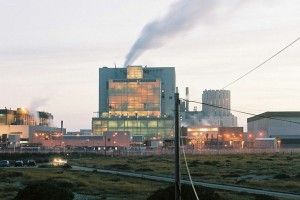Don’t discount nuclear option urges top DECC adviser
Climate Action spoke to the UK Department of Energy and Climate Change's Chief Scientific Advisor, Professor David MacKay, at the SDUK conference in London. Mackay questioned some of the nuclear scepticism caused by events in Japan and recommends keeping all the energy options on the table because moving away from nuclear would make it much harder to meet the UK's climate change targets.

 The tragic events in Japan have brought safety concerns about nuclear power back to the top of the agenda but the Department of Energy and Climate Change's (DECC) top scientist warned of overreaction and the need to keep all energy options on the table in order to combat climate change.
The tragic events in Japan have brought safety concerns about nuclear power back to the top of the agenda but the Department of Energy and Climate Change's (DECC) top scientist warned of overreaction and the need to keep all energy options on the table in order to combat climate change.
Japan recently raised the accident level at the Fukushima Daiichi nuclear plant from four to five on the International Atomic Energy Agency’s seven-point scale, one being an anomaly and seven full meltdown – Chernobyl is the only recorded seven.
Professor David MacKay, Chief Scientific Adviser to DECC, pointed out that nuclear reactor design has improved a lot since the Fukushima reactor was built.
“Reactor designs and standards have moved on and the Westinghouse design being proposed for the next generation [of UK nuclear power stations] actually has a passively safe cooling system,” said MacKay.
One of the major issues at Fukushima is that because the plant lost power from the grid and the back up diesel generators failed; the engineers could not run the cooling system designed to prevent meltdown.
“There are now nuclear designs that are passively safe so even if you don't have electric power for a few days, the heat can be passively removed.”
In the UK context, Fukushima is not directly relevant because the risk of massive earthquake is very low, however, he does think it is crucial to learn and pay attention all the time.
“I think some people are overreacting and the important thing to do is to keep all the options on the table and think very carefully about the risks because all technologies have risks,” he said.
“We've still got some learning to do, technologies are evolving – we should focus on all the technologies that could be low cost contributors [to mitigating climate change].”
MacKay's comments echo Chris Huhne, Secretary of State for DECC, who noted that the events in Japan are still unfolding and said: "We should not rush to judgement.
"It is important that we have the full facts at our disposal."
If the events in Japan were to lead to a movement away from nuclear in the UK, that would mean a significant change in lifestyle and other sectors having to make up the difference, he said.
According to MacKay this would involve more onshore and offshore wind, carbon capture and storage (CCS) power stations and biomass, but all of these sectors have their own problems.
CCS is only at the pilot stage, biomass is controversial because of land use problems and its impact on the food sector.
MacKay noted that onshore wind has popularity issues, offshore wind is expensive and both are intermittent because of the weather.
On the topic of CCS McKay said: “in principle it could work at very large scale but as yet it's unproven and I think it would be terribly reckless to say “oh yeah, let's just rely on carbon capture and storage and wind”, the risks and uncertainties are too big.”
DECC have a site for the first pilot CCS plant and a billion pounds of treasury money – the goal is to have 4 or 8 of these up and running by 2020 when industry could then step in.
MacKay, who spoke at the SDUK event in London, has developed with DECC an opensource spreadsheet for people to assess the different pathways available when thinking about reaching the UK climate change target for 2050.
For further information:






